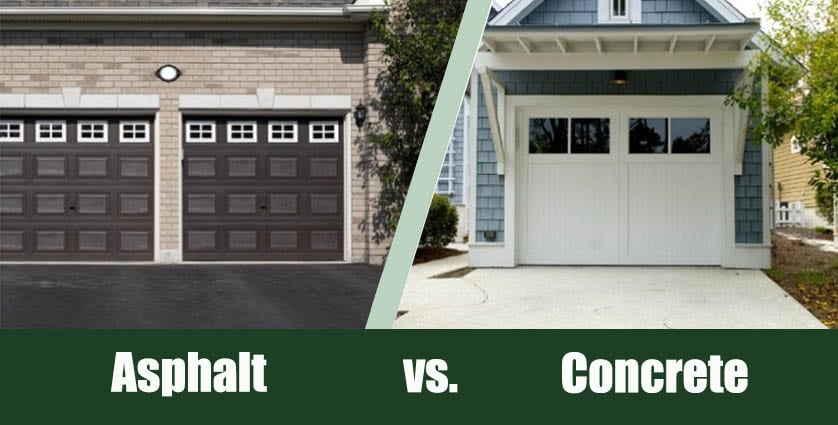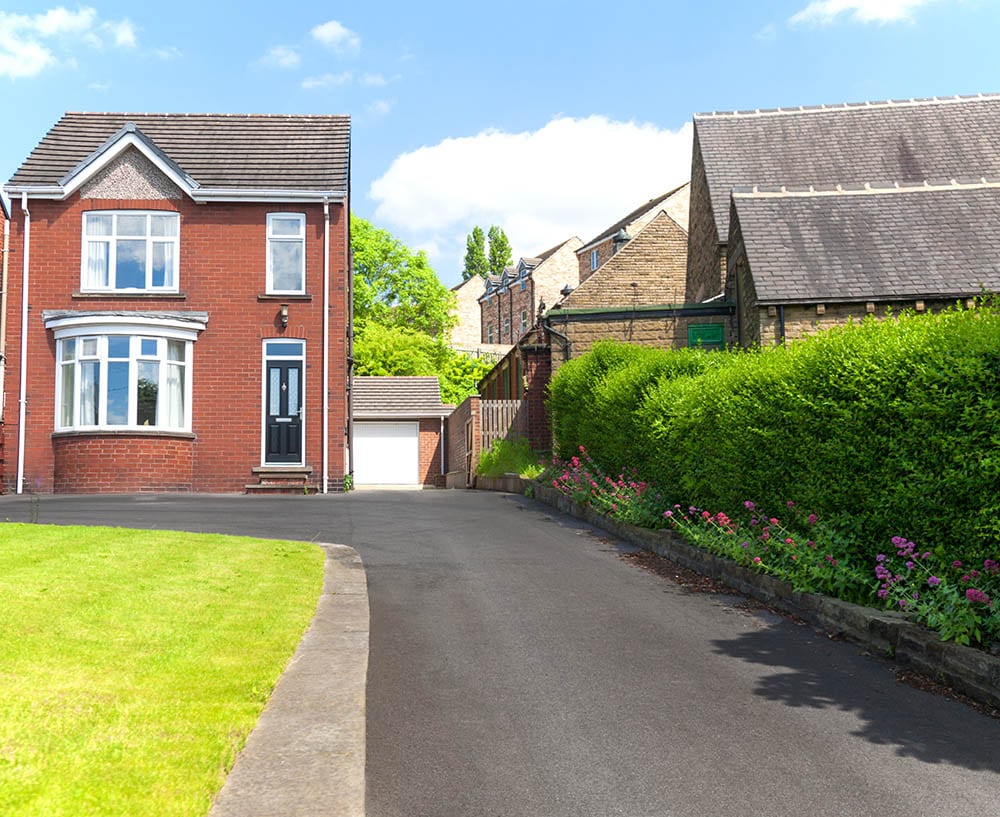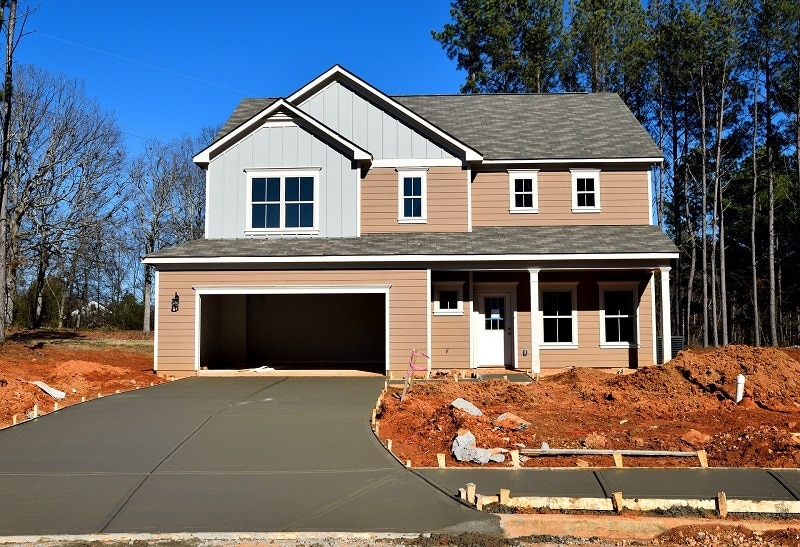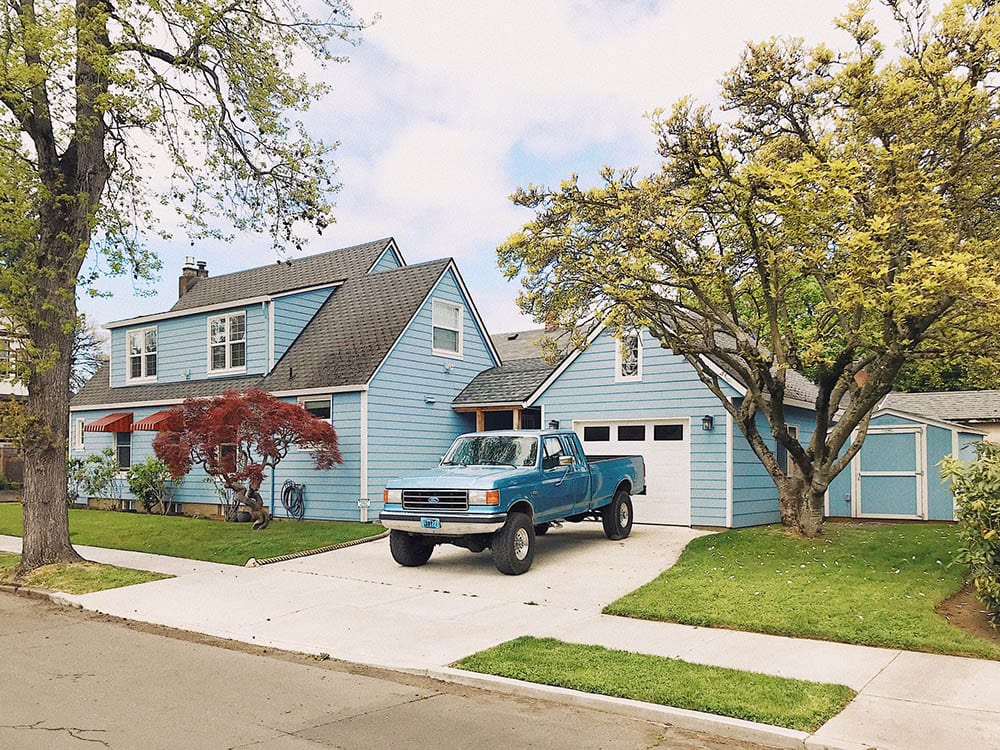Asphalt vs Concrete Driveway: Pros, Cons & Verdict
-
Pete Ortiz
- Last updated:

When it comes to building a new home or updating your home’s exterior, the look and quality of your driveway are crucial as it is the first thing that people see when approaching your house. The type of material you choose when redoing your driveway is a big decision, and you will want to ensure that it not only looks good but will also hold up over time.
Asphalt and concrete are two of the most popular paving materials as they both have many attractive features. However, there are also many differences you should take into consideration when choosing which is right for you. See below for a comprehensive comparison of the two to help you decide which material will best fit your style, climate, and budget.
Overview of Asphalt

Asphalt is similar to concrete in that it is an aggregate material of a mixture of stone and sand combined with an adhesive base. However, asphalt contains petroleum instead of cement as the binding agent, which is contained in concrete. It is poured over a level gravel base before it’s smoothed over with a steamroller. You can use it within 24 hours after the asphalt is poured.
Asphalt is roughly half the price of concrete,and you don’t have to replace the existing base when replacing a driveway with asphalt. While asphalt driveways are easier to repair in the short term and can last for decades, they require resurfacing and resealing approximately every 3 to 5 years.
Because asphalt is a softer material, repairing it is more straightforward than concrete as repaired cracks blend together nicely. Also, asphalt uses less energy in the construction process and is recyclable. You can use the asphalt from your old/existing driveway to create the new one.
Many consider asphalt to be nicer to look at compared to the duller grey color of concrete, and it will often match the color of the street.. Additionally, asphalt has a lifespan of about 20 or 30 years and can last even longer with proper maintenance. It is a more flexible material than concrete and less prone to cracking, especially if you live in a climate with a harsh winter.
On the downside, asphalt can get very hot and is not as ideal for warmer climates, as it absorbs heat. It can stick to tires and shoes in extreme temperatures. Unfortunately, when compared to concrete, asphalt has fewer customization options, and it does not offer as many creative features.
- Lower initial cost
- Easier to repair
- Eco-friendly
- Flexibility
- Higher maintenance costs
- Less stable in higher temperatures
- Cannot alter the color
 Overview of Concrete
Overview of Concrete

Concrete is a mix of cement, sand, and gravel. Although it can take 28 days for concrete to cure entirely, you can walk on it after 24–48 hours. After a week, it’s safe to park vehicles or heavy equipment on the surface. While the curing process is longer than asphalt, concrete is a stronger and more durable material and holds the weight of trucks or RV’s better than asphalt.
While the initial cost may be higher with concrete, maintenance costs are much lower than asphalt. A concrete driveway can last up to40–50 years with proper maintenance. What’s more, concrete reflects light and absorbs less heat than asphalt. It is generally much better for warmer climates and is more pleasant to walk on as a result.
While some may not love the standard gray color of concrete, it is very versatile, and you can customize the appearance of the surface with patterns or different colors.
Paving with concrete has a higher initial cost. While it can be cheaper in the long run, the initial cost is much higher than asphalt. While concrete is more durable overall, short-term repairs are much harder to replace or resurface. Oil grease and stains are less noticeable on dark asphalt, but they’re more visible on an untinted concrete surface.
Also, concrete is trickier to use in chilly climates. If the temperature of the concrete mixture drops below 50° F, the curing process slows down, but if it drops below 40°F, the curing stops entirely. However, you can use insulated blankets or a heated enclosure to maintain proper curing in freezing weather. As long as the material does not freeze in the first 24 hours during curing, concrete will not crack in lower temperatures.
Contractors in cooler regions also use accelerants to speed up the curing process. While concrete may be more difficult to use than asphalt in colder temperatures, it can be successfully installed when you maintain the correct curing temperature.
- Low maintenance
- Long lifespan
- Does not melt in hot climates
- Can be tinted
- High Initial cost
- Difficult to repair
- Chemical and oil stains are more visible
- Curing is more challenging in colder weather
When to Use Asphalt vs Concrete

| When to use asphalt | When to use concrete |
| You prefer a streamlined appearance that matches the street. | If you would like more visual options or would like to match your home’s color scheme. |
| You don’t have equipment to keep concrete warm in cold weather | You live in a warmer climate. |
| You don’t plan on being in your current home for long and would like a quick return on investment. | You plan to stay in your home for several years and prefer less maintenance. |
| You need to use your driveway right away. | You don’t mind waiting 24–48 hours before walking on your driveway. |
 Final Thoughts
Final Thoughts
Unfortunately, there is no clear-cut answer as to whether you should choose asphalt or concrete, and it is very dependent on individual circumstances. Weather, cost, and overall appearance are the major factors that you should consider while making this big decision. While concrete is more challenging to cure in cold weather, it will hold up in any climate if you maintain the correct curing temperature. However, asphalt is easier to install and repair. If you are still unsure, contact your local professional for additional information on concrete and asphalt driveways.
- https://www.bobvila.com/articles/concrete-vs-asphalt-driveways/
- https://www.angi.com/articles/pros-and-cons-asphalt-vs-concrete-driveway.htm
- https://www.uniquepavingmaterials.com/asphalt-vs-concrete-driveways-which-is-right-for-you/
- https://www.homeadvisor.com/r/asphalt-vs-concrete-driveway/
- https://www.cmi-paving.com/blog/asphalt-vs-concrete-driveway/
Featured Image Credit: (L) LesPalenik, Shutterstock | (R) Piqsels
Contents


 Final Thoughts
Final Thoughts